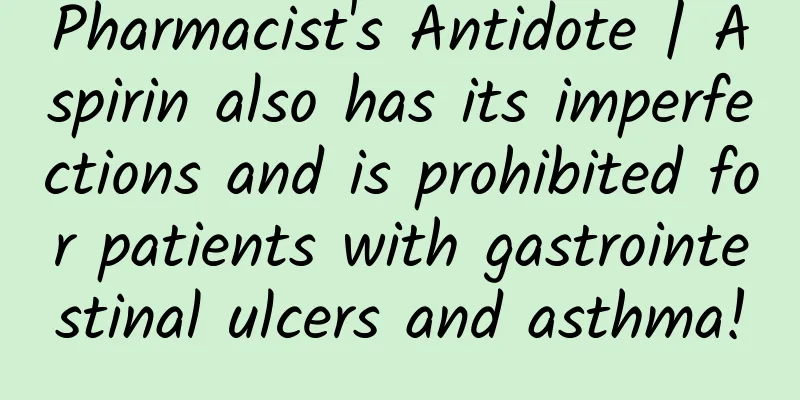Pharmacist's Antidote | Aspirin also has its imperfections and is prohibited for patients with gastrointestinal ulcers and asthma!

|
Spanish thinker Ortega y Gasset once said: "If I were to be on a deserted island and choose to take a certain medicine with me, the first thing that comes to mind is aspirin!" This sentence vividly depicts the value of aspirin to mankind. From the initial analgesic and antipyretic to the current prevention and treatment of atherosclerotic cardiovascular disease (ASCVD), aspirin has been enduring for more than 100 years. Widespread pharmacological action is to block the neck of prostaglandins Prostaglandins are present in every human body, regardless of gender. They are widely present in human organs, tissues, and blood, and have powerful and complex physiological functions. Prostaglandins are a large family that includes many types of substances, one of which is called thromboxane A2. Like most prostaglandin substances, the predecessor of thromboxane A2 is arachidonic acid, which, under the action of cyclooxygenase-1, undergoes a series of metabolisms and finally "dresses up" by prostaglandin synthase to become thromboxane A2. One of the functions of thromboxane A2 is to activate platelets and promote thrombosis. The blood vessel walls of the human body can be damaged due to trauma and other reasons, and thrombi can form at the damaged sites. Timely hemostasis is an important part of the body's self-protection and repair mechanism. However, for high-risk groups of cardiovascular and cerebrovascular diseases such as angina pectoris, myocardial infarction, cerebral infarction, and patients undergoing arterial vascular interventional surgery, the formation of thrombus means the arrival of fatal diseases such as acute myocardial infarction and cerebral infarction. Inhibiting the activity of cyclooxygenase-1 can inhibit the formation of thromboxane A2, thereby blocking the thrombus formation process. Aspirin binds to cyclooxygenase-1 and acetylates cyclooxygenase, which can irreversibly inhibit the generation of thromboxane A2 in platelets. Under its action, thromboxane A2 cannot be generated, and the thrombus formation process is interrupted, thereby achieving the pharmacological effect of antiplatelet and inhibiting thrombosis. Prostaglandins are also related to the induction of peptic ulcers and asthma Aspirin can make prostaglandins disappear in the human body, but prostaglandins are not completely useless. Prostaglandins have the function of inhibiting gastric acid secretion, maintaining the integrity of the gastrointestinal mucosa, and protecting the digestive tract mucosa from irritants such as gastric acid and alcohol. Aspirin blocks the source of prostaglandins, and the gastrointestinal mucosa without the protection of prostaglandins will increase the chance of ulcers, especially gastric ulcers. Therefore, patients with acute gastrointestinal ulcers are prohibited from using aspirin, and patients with a history of gastrointestinal ulcers or gastrointestinal bleeding should take medication as prescribed by a doctor. Aspirin blocks the path of arachidonic acid being converted into prostaglandins, but leaves another path: arachidonic acid can be converted into leukotrienes through the action of deoxygenase. Leukotrienes are not honest substances and are good at provoking inflammatory reactions in the body. They bind to receptors on the tracheal mucosa, causing contraction of tracheal smooth muscles and inducing asthma attacks. Asthma induced by aspirin is also called aspirin asthma. Literature reports that the incidence of aspirin asthma is about 2% among patients using aspirin in my country. How to deal with the imperfection of aspirin Patients with the above contraindications are prohibited from using aspirin. In addition, before using aspirin, the following points should be noted: 1 When you see a doctor, tell your doctor your medical history. The doctor will assess the risks of medication, including the risk of gastrointestinal bleeding, and treat active gastrointestinal lesions in advance, including eradication of Helicobacter pylori. If necessary, use ulcer-inhibiting drugs prophylactically. 2 When you see a doctor, recall your history of adverse reactions such as allergies and asthma, and let the doctor determine the relevant risk factors. Since most aspirin asthma patients have nasal polyps, sinusitis, allergic rhinitis and other diseases, patients should treat nasal diseases as soon as possible to prevent them from becoming the basis for asthma attacks. 3 Aspirin is also contraindicated in patients with bleeding constitution, liver failure or kidney failure. Understand the contraindications of aspirin, use aspirin rationally, and properly handle possible adverse reactions, so that aspirin can truly become "a blessing brought to mankind by civilization." |
>>: Yaowa Quiz | Does vitamin C help the absorption of iron?
Recommend
I haven't had my period for 50 days and I'm not pregnant
For women, menstruation is a period that comes on...
What causes yellow leucorrhea like pus?
Why does leucorrhea turn yellow like pus? This in...
My breasts hurt when I get angry
Many female friends find that they feel dull pain...
How much do you know about Restless Legs Syndrome, a precursor to Parkinson's disease?
Parkinson's disease (PD) is the second most c...
Why pregnant women give birth to boys
After pregnancy, the probability of having a boy ...
I regret having my hysterectomy every day
The uterus is a very important organ for women. I...
How long after giving birth can I donate blood?
Blood is very scarce now, and we need continuous ...
Well-known musician passed away, and was hospitalized several times due to pneumothorax! Be alert if you have these symptoms, it may be your body's "call for help"
According to media reports, the well-known musici...
How to take care of the pimples at the vaginal opening?
The vaginal opening is a barrier for women to res...
Gram-negative bacilli vaginitis
What kind of disease is Gram-positive-negative st...
What should I do if my kidney is deficient after childbirth?
Kidney deficiency after miscarriage is a common p...
Causes of abdominal pain during menstruation
Menstruation is a physiological phenomenon unique...
Pregnancy 160 days matters needing attention
Women need to pay attention to different matters ...
How many times should chemotherapy be given for breast cancer in the middle stage
Breast cancer is a malignant tumor that seriously...
What are the exercises for slimming legs for girls?
Nowadays, there is almost no woman who does not l...









